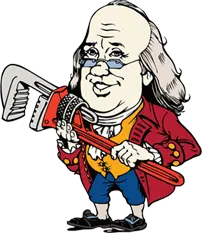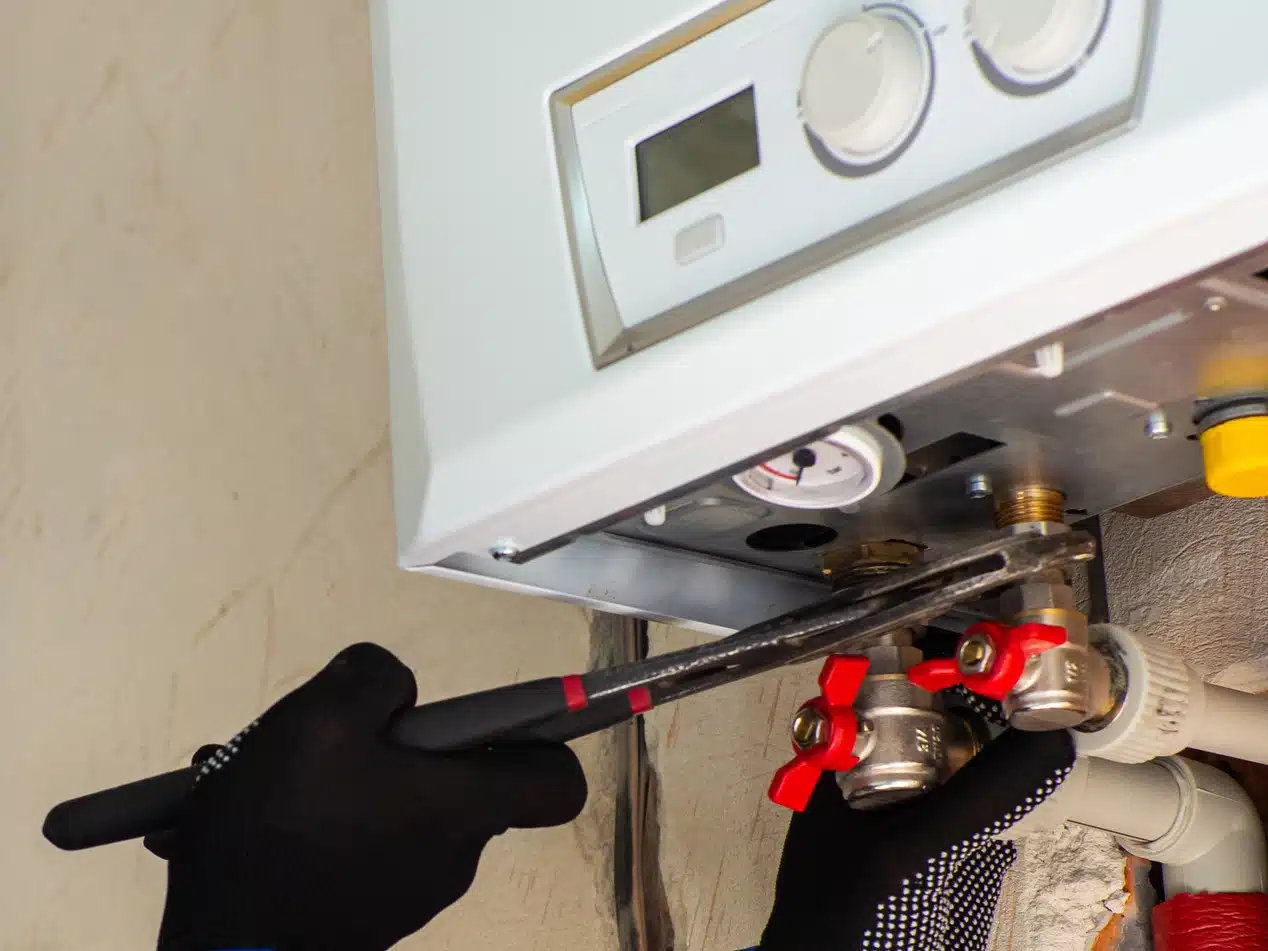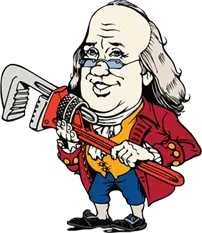Water Heater Maintenance – Taking care of your water heater is important to keep it running well. You need to flush it out regularly, adjust the temperature, and check the TPR valve. Doing this helps prevent problems and makes your water heater last longer.
Understanding Your Water Heater
Ever wondered how water heater maintenance affects your home in Harrisburg, PA? Knowing the main parts of your water heater can help you see its importance. There are three main types: storage tank water heaters, tankless water heaters, and heat pump water heaters. Each type suits different household needs.
Key parts include the thermostat, heating element, and the temperature and pressure relief (TPR) valve. The TPR valve is a big safety feature; it will release water if things get too hot or too high in pressure, stopping possible dangers. Did you know water heaters often use fossil fuels like natural gas and oil to heat water directly or make electricity? In the U.S., gas-powered heaters are common.
Smaller storage water heaters, from 10 to 35 liters, work well in hot places because the air there is warm. Knowing this helps with better maintenance and fixing problems. Understanding water heater maintenance helps you take steps to prevent issues.
Benjamin Franklin Plumbing of Lancaster, PA, serving Harrisburg, PA, suggests regular check-ups and proactive maintenance for safe and efficient use. Calling professionals can make a big difference!
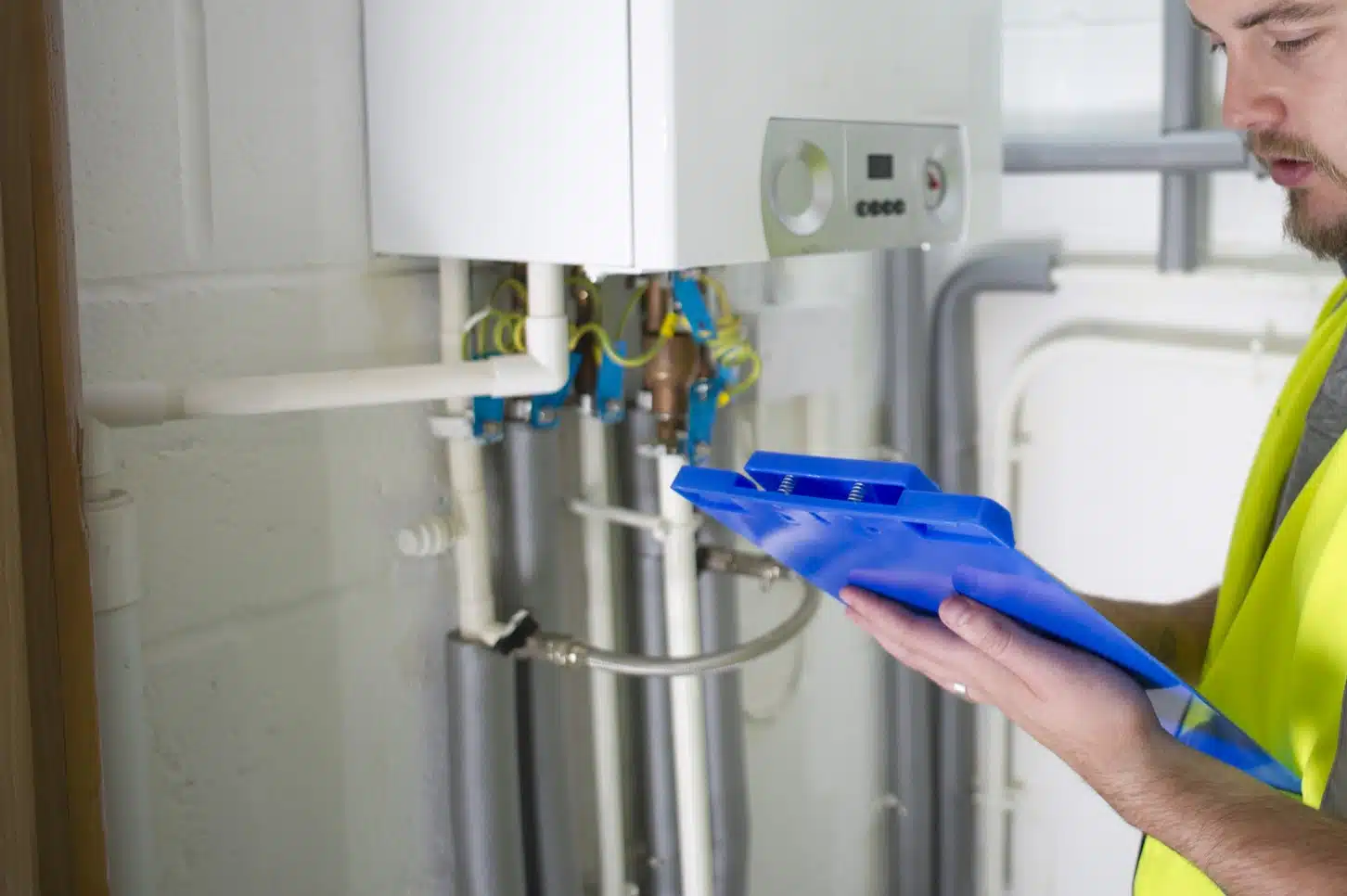
Importance of Regular Water Heater Maintenance
Are you keeping up with your water heater’s regular check-ups? Water Heater Maintenance is key to making your unit last longer and keeping your home safe and efficient. Simple routine checks can save you from costly repairs and dangerous problems.
First, Water Heater Maintenance boosts efficiency. A well-kept water heater uses less energy, cutting down your utility bills. Plus, it makes sure you get hot water fast, which is vital during cold Harrisburg, PA winters. Ignoring maintenance can lead to sediment buildup, lowering heating efficiency and causing damage.
Next, routine checks reduce safety risks. Parts like the thermostat and pressure relief valve can wear out over time, posing serious dangers. Making sure these parts work well prevents accidents and keeps water pressure safe.
Lastly, routine maintenance can make your water heater last longer. Flushing the tank, checking the anode rod, and looking for leaks can add years to your heater’s life. In short, Benjamin Franklin Plumbing of Lancaster, PA is here to keep your water heater in top shape with expert maintenance services.
Signs Your Water Heater Needs Maintenance
Is your water heater making strange noises or not heating as well as it used to? These might be signs it needs Water Heater Maintenance. Watch out for rusty water, which often means the anode rod is corroded or there’s internal rust. This rust can harm water quality and cause leaks.
Another warning sign is water pooling around the base of the unit. This could mean cracked tanks or bad connections. Also, inconsistent water temperatures and high energy bills suggest sediment build-up is making your heater work too hard.
Hearing popping, banging, or other odd noises?
These sounds usually come from sediment build-up at the tank’s bottom. When the burner heats this sediment, it makes noise and reduces the heater’s efficiency. Check your pilot light too. If it often goes out, there might be an issue with the thermocouple or another part.
Regular Water Heater Maintenance can prevent these problems and keep your system running well, giving you peace of mind and steady performance. If you see these signs, it may be time to call Benjamin Franklin Plumbing of Harrisburg, PA. Your home’s comfort relies on it!
Essential Tools and Materials for Water Heater Maintenance
When you maintain your water heater, the right tools and materials are key.
Here’s what you’ll need to get started:
- Adjustable wrench: Perfect for tackling nuts and bolts on your heater.
- Garden hose: Essential for draining the tank.
- Pipe tape: Helps create leak-free seals around threaded connections.
- Flashlight: Handy for seeing in dim areas.
- Bucket or large container: Useful for catching excess water and keeping your floor dry.
For more advanced tasks in Harrisburg, PA, you’ll need:
- Voltage tester: Ensures electrical safety.
- Sandpaper: Good for cleaning rusty parts inside the tank.
- Replacement anode rods: These rods prevent corrosion inside your tank, extending its life.
With these tools and materials, you can handle routine water heater maintenance and keep your water heater in top shape.
Safety Precautions Before Water Heater Maintenance
Ready to work on your water heater maintenance? Before you start, let’s talk safety. Ignoring safety steps can be very dangerous.
Electrical Safety
First, always turn off the power. For electric heaters, flip the circuit breaker. Electricity and water are a deadly pair, so don’t skip this step!
Gas Safety
Working with gas? Gas safety is key. Turn off the gas supply. Find the gas valve and turn it to ‘off’. Open nearby windows for air. Smell gas? Leave right away and call a professional.
General Tips
Wear gloves and goggles. Water heaters can have sharp sediment. Handle tools carefully to avoid accidents. Keep a fire extinguisher close by.
If you’re in Harrisburg, PA, local regulations might also require additional safety measures. Taking these steps will help ensure you don’t turn a small fix into a big accident. It’s better to be safe than sorry when dealing with electricity and gas. Happy and safe water heater maintenance!
How to Flush Your Water Heater
Ever wondered why water heater maintenance matters?
Flushing your water heater helps it last longer and work better.
Here’s a simple guide to get it done right.
- Turn Off Power and Water: Turn off the power to your water heater at the circuit breaker. For gas heaters, set the thermostat to “pilot.” Close the cold water valve.
- Connect a Garden Hose: Attach a garden hose to the drain valve at the bottom of the tank. Put the other end in a drain or outside.
- Open the Drain Valve: Open the drain valve and let the water flow out through the hose. This will clear out sediment inside the tank.
- Flush with Cold Water: Once the tank is empty, open the cold water supply for a bit to stir up any leftover sediment. Keep going until the water runs clear.
- Close Valves and Refill: Turn off the drain valve and remove the hose. Open the cold water valve to refill the tank. Turn on a hot water faucet to remove any air pockets until the water flows smoothly.
- Restore Power: Turn the power back on or adjust the thermostat for gas heaters.
Follow these steps to keep your water heater running well, thanks to Benjamin Franklin Plumbing of Harrisburg, PA.
Remember, regular water heater maintenance can save you from unexpected breakdowns and ensure efficient performance.
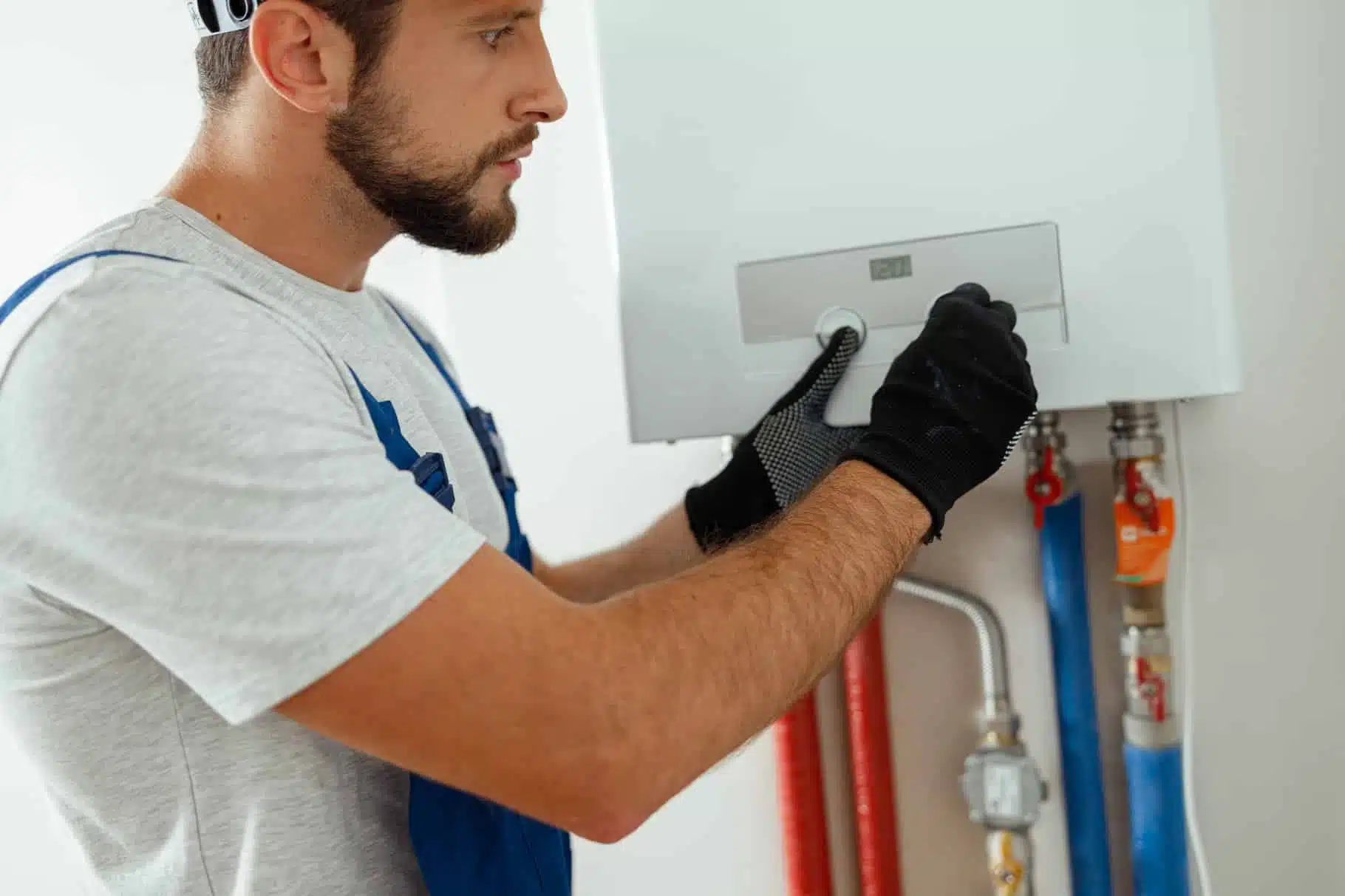
Adjusting the Water Temperature
Wonder why your water heater isn’t giving you the right hot water? Adjusting the water temperature is key for comfort, safety, and efficiency. Wrong settings can cause burns or cold water, mess up your routine, and hike your energy bill. Proper Water Heater Maintenance ensures your system runs efficiently.
Importance of Correct Temperature
Setting your water heater to the right temperature matters. The U.S. Department of Energy says to keep it at 120°F (49°C). At this level, the water is comfy and safe. Higher temps can burn you, and lower temps might not kill harmful bacteria like Legionella.
How to Adjust Settings
Adjusting the water temperature on most heaters is simple. Find the thermostat—usually behind a panel on electric heaters or near the bottom on gas models.
You’ll see a dial or digital control.
- Turn off the power supply to the heater for safety.
- Use a flathead screwdriver to adjust the dial.
- Rotate the dial to set the temperature to 120°F (49°C).
- Restore the power and wait a few hours, then test the water temperature with a thermometer under running water.
By keeping the temperature settings right, you’ll have safe, efficient hot water in your Harrisburg, PA home. For expert help, Benjamin Franklin Plumbing of Harrisburg, PA is always ready to assist with Water Heater Maintenance!
Checking the Temperature and Pressure Relief (TPR) Valve
Do you know how important the Temperature and Pressure Relief (TPR) valve is for your water heater’s safety? This small part lets out water if the tank gets too hot or too much pressure builds up, stopping bursts or failures. Checking this valve often is a crucial aspect of Water Heater Maintenance and can keep you safe, saving you money on repairs.
To test the TPR valve, first turn off the power if you have an electric heater or set your gas heater to “pilot.” Put a bucket under the valve’s discharge pipe to catch any water. Carefully lift the TPR valve lever; you should hear a short rush of air or see some water come out. This means the valve works well. If no water comes out or if there’s a steady drip afterward, you need to replace the valve.
For any problems that aren’t basic, contact pros like Benjamin Franklin Plumbing of Harrisburg, PA. They know how to handle tough plumbing issues, ensuring effective Water Heater Maintenance to keep your water heater safe and working well. Stay on top of things, and you’ll keep a safe, effective water heater that serves you well.
Inspecting and Replacing the Anode Rod
Did you know your water heater’s lifespan largely depends on the anode rod? The anode rod attracts corrosive elements in the water, keeping the tank from rusting and lasting longer. Regular Water Heater Maintenance can help you extend the life of your unit efficiently.
First, find the anode rod. It’s usually at the top of the unit. Depending on your water heater, you might need a socket wrench to remove it. Before you start, turn off the power and water supply to stay safe.
Next, inspect the rod closely. If it’s covered in calcium carbonate or is less than half an inch thick due to corrosion, it’s time to replace it. To replace it, unscrew the old rod and put in a new one.
Make sure it’s tight.
Use Teflon tape on the new rod’s threads to stop leaks. Once done, turn the water and power back on and check for leaks around the new rod. Regularly checking and replacing the anode rod is an easy way to keep your water heater in good shape for years. If you need help with Water Heater Maintenance, Benjamin Franklin Plumbing of Harrisburg, PA is your expert for water heater care.
Insulating Your Water Heater for Better Efficiency
Want to make your water heater last longer and save on your bills? Insulating your water heater is a simple fix.
It cuts down on heat loss, keeps your water hot longer, and lowers energy use. This small step can lead to big efficiency gains and a more effective heater.
Benefits of Insulation
The big plus of water heater insulation is better energy use. When your heater keeps the water hot with less work, you’ll see a drop in your energy bills. This is great for older models that lose heat faster. Insulation cuts down on heat loss, which eases the load on the heater and helps it last longer.
Also, insulating your pipes makes sure hot water gets to your faucet quicker, which is handy in winter in Harrisburg, PA.
Insulating the Tank and Pipes
To make the most of your water heater maintenance, consider using a water heater blanket to insulate the tank. Pick one made for your model and size. Follow the maker’s guidelines to make sure all safety features and labels stay visible.
For pipes, use pipe insulation sleeves. Focus on the first six feet of both the hot and cold water pipes linked to your heater. This boosts the heater’s efficiency and makes your home more comfortable.
Remember, a small spend on insulation today means better use and a longer-lasting water heater tomorrow. Proper water heater maintenance is key to ensuring your system remains efficient and effective.
Common Water Heater Problems and How to Fix Them
Inconsistent Hot Water
Is your water sometimes hot and sometimes lukewarm? This can be very annoying. The problem is often the thermostat. Make sure it’s set right; 120 degrees Fahrenheit is usually best. If adjusting it doesn’t work, the thermostat might be bad or you may need a new heating element. Regular Water Heater Maintenance can prevent these issues and maintain consistent water temperature.
Strange Noises
Hearing popping, banging, or rumbling noises from your water heater? This is a sign of sediment build-up at the bottom of the tank. Over time, minerals settle and harden, making the unit work harder and get noisy. The fix? Flushing the tank can clear out this sediment, making your water heater work better and quieter. Scheduling frequent Water Heater Maintenance is key to avoiding these noisy problems.
Leaks and Water Quality Issues
A leaking water heater is a big problem. Check if the leak is from the valve, pipe, or tank. A bad valve or loose connections can often be tightened or replaced easily. But if the tank is leaking, you may need a new one to avoid flooding and water damage.
Water that looks rusty or smells bad might mean the anode rod needs replacing. Residents in Harrisburg, PA, should especially be mindful of these signs and seek professional help when needed. For any big or recurring issues, call Benjamin Franklin Plumbing of Lancaster, PA. Their expert team can handle all your plumbing needs and make sure your water heater runs well.
Best Practices for Extending Your Water Heater’s Lifespan
Is your water heater always breaking down at the worst times?
Prevention is key.
Regular care keeps your water heater in top shape.
- Do Annual Checkups: Have a pro like Benjamin Franklin Plumbing of Harrisburg, PA check your water heater at least once a year. This finds issues early and avoids big repairs.
- Flush the Tank: Sediment buildup can mess up your heater. Flush the tank every six months. Attach a hose to the drain valve and let the water flow until clear.
- Check the Anode Rod: This rod stops rust by attracting corrosive elements. Check it once a year and replace it when worn out. This helps your tank last longer.
- Insulate the System: Wrap your water heater and the first few feet of pipes with insulation. This boosts energy efficiency.
- Set the Thermostat: Keep the thermostat at 120°F. It’s safe and saves energy.
By following these Water Heater Maintenance tips, your water heater will run smoothly, giving you warm showers and peace of mind with professional assistance available in Harrisburg, PA.
FAQs
-
What are the benefits of regular water heater maintenance?
Regular water heater maintenance keeps your water heater efficient, extends its life, and prevents sudden breakdowns. It also boosts performance and can save you money on bills and repairs.
-
How often should I flush my water heater?
Flush your water heater at least once a year. This removes sediment build-up, which can hurt performance and lower efficiency. If you have hard water, do it more often.
-
What should I do if my water heater is making strange noises?
Strange noises like popping or rumbling usually mean there’s sediment in the tank. Flushing the tank usually fixes this. If the noises continue, call a pro like Benjamin Franklin Plumbing of Harrisburg, PA.
-
How do I know if the TPR valve is working properly?
To test the TPR valve, lift the lever and let it snap back. Water should come out. If there’s no water or it drips, it needs replacing. For help, contact Benjamin Franklin Plumbing of Harrisburg, PA.
-
Can I adjust the temperature on my water heater myself?
Yes, you can adjust it. Set it between 120-140°F for the best performance and safety. Always turn off the power before adjusting. If you’re unsure, ask for expert help from Benjamin Franklin Plumbing of Harrisburg, PA.




